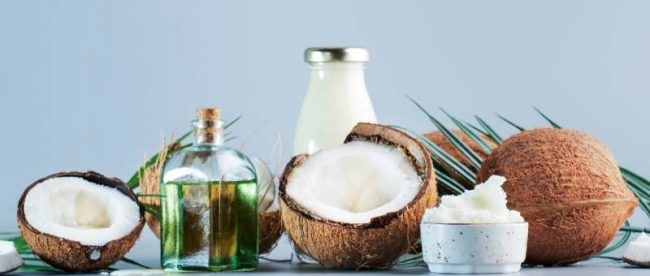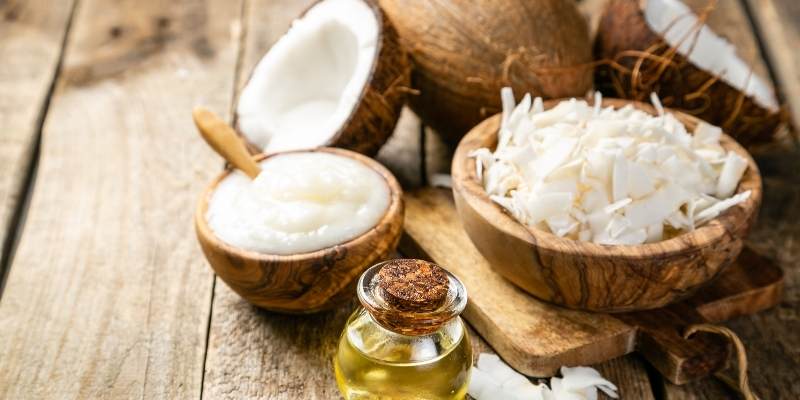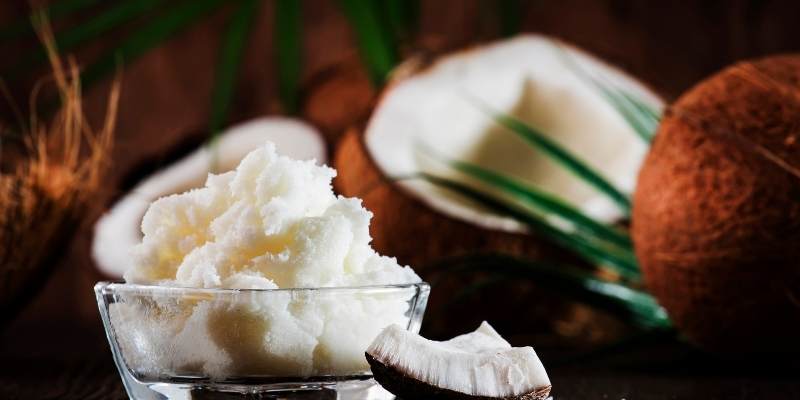MCT Oil vs. Coconut Oil: What’s the Difference & Which One Is Better for Keto?

MCT oil is a hot commodity in the keto-diet world. It helps you to get into ketosis super fast by releasing ketones in the body. It’s a quick hack for getting into ketosis, and it works within a few hours, as opposed to a high fat, low carb diet over several days.
And is found in large quantities in coconut oil. But why should you bother with MCT oil if coconut oil can do the same things? In this post, I’ll try to figure out all the details of comparing MCT oil vs. Coconut oil.
Do you have a particular question about the differences between MCT oil vs. Coconut oil? Then use the table of contents below to jump to the most relevant section. And you can always go back by clicking on the arrow in the right bottom corner of the page. Also, please note that some of the links in this article may be affiliate links. For more details, check the Disclosure section at the bottom of the page.
What is MCT coconut oil?

MCT stands for Medium Chain Triglycerides. Triglycerides are fats – and fats are “good” for the ketogenic diet. The body breaks down Medium-chain triglycerides at a fast rate, consequently releasing ketones. Once there are ketones present in your body, you are in ketosis.
MCT oils contain either lauric acid, caprylic acid (C8) or capric acid (C10), or a combination of those. These are triglycerides, and the C stands for carbon atoms. Lauric acid is an MCT found in coconut oil. It has 12 carbon atoms and is left out of MCT oils because it isn’t absorbed as quickly as caprylic or capric acid.
Even though MCTs are found in large quantities in coconut oil, it doesn’t mean it is the same.

Is MCT oil the same as coconut oil?
Here is the difference: Coconut oil has a certain amount of MCT’s in it.
MCT oil is an extraction of only MCT’s from coconut or palm kernel oil. It doesn’t have any of the other filler contents of coconut oil. It is simply a supplement that is jam-packed with 100% MCT’s.

Calories in MCT oil vs. coconut oil

One teaspoon of MCT oil contains 39 calories. On the ketogenic diet, you don’t have to track calories. Weight loss while in ketosis depends on you eating high fat, low carb foods. However, if you are combining intermittent fasting with the ketogenic diet (many people do this), you might want to reduce your MCT dose while on a fast.
One teaspoon of coconut oil contains 40 calories. Most of the fats in coconut oil are from MCT’s. Remember that the coconut oil MCT content is 54% of its overall composition.

Is MCT oil better than coconut oil?
Do you want to incorporate MCT oil or coconut oil into your ketogenic diet? Here are the facts:
MCT oil has amazing benefits for ketosis. It is a supplement containing 100% MCT’s. When you consume MCT oil, ketones are produced by your liver. This sends signals to your body to use fats, not carbs, as fuel – thereby leading to weight loss.
Coconut oil contains MCT’s. However, these MCT’s take longer to digest in the body. Getting into ketosis using coconut oil is a slower process. Although coconut oil is still a great addition to your cooking ingredients list because it is keto-friendly. Just don’t use it for deep frying. Virgin coconut oil, for instance, has a relatively low smoke point – 350F. At this temperature, the oil will fill your room with smoke and change the food’s taste and lead to producing harmful free radicals.
You may want to stick with a quick saute instead of deep-frying. Overall this cooking method is still healthier, regardless of the type of oil you are using.
Overall verdict: MCT oil is better than coconut oil for ketosis.

How much MCT oil in coconut oil?
MCT oil is an extract containing 100% MCT’s. It is obtained through a man-made process called fractionation. Fractionation extracts and isolates MCT from coconut and palm kernel oil.
So, what is the MCT oil content in coconut oil? The MCT content in coconut oil is roughly 54% of the total composition. Here are the approximate percentages of MCT’s that are naturally present in coconut oil:
- Lauric acid (C12) – 42%
- Caprylic acid (C8) – 7%
- Capric acid (C10) – 5%

Does all coconut oil have MCT?
Does all coconut oil have MCT? Yes, all coconut oil has MCT in it. MCT’s exist naturally in coconut oil. They are the source of fats in coconut oil, aside from unsaturated fats. MCT’s are fats that can be digested easily, and they release ketones. Ketones are chemicals your liver produces when you don’t have enough insulin to turn sugar into energy. They signal your body to use fats for energy.

Difference between MCT oil and coconut oil?
MCT oil and coconut oil are similar – MCT is extracted from coconut oil. However, there are quite a few differences between the two, considering they have different compounds in their composition.
MCT Oil
MCT oils are used to induce ketosis, and this helps in weight loss and boosts brain clarity. An MCT oil supplement in the market will typically contain only 100% MCT’s. The MCT’s (Medium Chain Triglycerides) added in store-bought MCT oils are Caprylic acid and Caproic acid. These MCT’s are extracted from coconut oil. Our bodies absorb these MCT’s easily, and the body uses them as a source of energy.
Coconut Oil
Coconut oil is an oil derived from coconuts’ white flesh through either hot extraction or cold press methods. It is used for cooking and also in beauty products.
Coconut oil contains not only MCT’s but also LCT’s (Long Chain Triglycerides) and unsaturated fats. Coconut oil gives you the benefits of MCTs, but at a lower rate than an MCT oil.

Benefits of MCT oil vs. coconut oil on keto
Here are some of the most common benefits of MCT oil and coconut oil:
MCT oil is better for ketosis and weight loss
MCT oil will jumpstart your ketosis. MCT’s cause your liver to release ketones into your blood. These ketones signal your body to break down fat, and not sugar, for energy. Staying in ketosis will ensure that your body utilizes your body fat for energy, leading to weight loss.
Coconut oil is better for cooking and flavor
Coconut oil has a fantastic taste, and it is excellent for stir-frying to its relatively high smoke point. There are loads of keto-friendly recipes that could use a splash or two of coconut oil.

MCT oil vs. coconut oil in coffee

There are several ways to incorporate MCT oil into your keto diet. One of the simplest ways is to add it to your daily morning coffee (or other drink of choice, like a green smoothie, if you are off caffeine).
MCT’s break down faster than other fats in the body. Your morning cup of MCT oil coffee will give you that concentrated amount of fat burning and brain-boosting you need for the day ahead.
People add coconut oil to their coffee too. Coconut oil does contain a sufficient amount of MCT’s, and you can use coconut oil to boost your ketosis. However, these MCT’s won’t be absorbed immediately in the body to provide you the instant energy boost that you need. The absorption process is slower than using MCT oil.
Other ways to eat MCT Oil:
- Use MCT oil as an ingredient in your keto salad dressing
- Stir-frying veggies on a low heat
- Make smoothies with it

Which is better for weight loss MCT or coconut oil?
MCT oil can catapult you into ketosis, the process where your body uses your fats for energy. Remember that an average person takes anywhere from two days to a week to get into ketosis by eating a high fat, low carb diet.
MCT oil can get you into ketosis in a significantly shorter time than that. If you don’t have the patience to wait for naturally induced ketosis, consider incorporating an MCT oil into your diet.
On the other hand, coconut oil is absolutely ketogenic diet-friendly due to high fat and low carb composition.
That said, MCT oil can give you a considerable ketone boost in a shorter time than coconut oil.
Thanks for the graphics: Canva.com
Disclosure: At vegketodiet.com I only mention the products that I researched and considered worthy. But it’s important to note that we are a participant of several affiliate programs, including but not limited to VigLink and Amazon Services LLC Associates Program. As an Amazon Associate, this website earns from qualifying purchases. Also please note that I am not a doctor. As such readers are strongly recommended to make decisions that might affect their health by doing their own research. At vegketodiet.com I only document and describe thoughts, researches and ideas that proved to be working for me.

